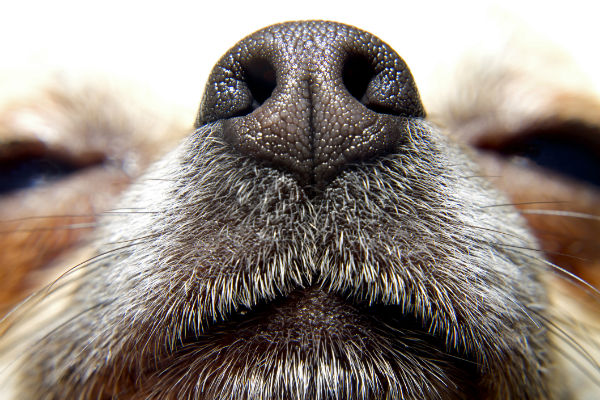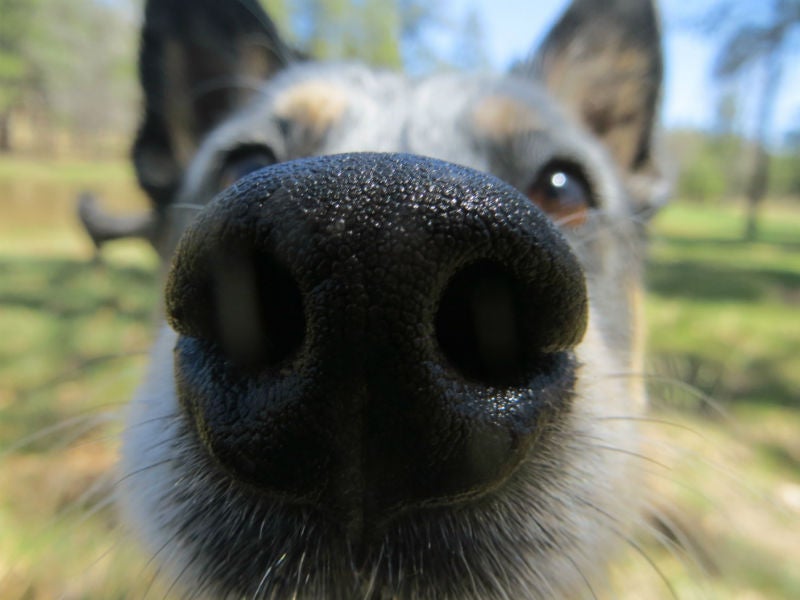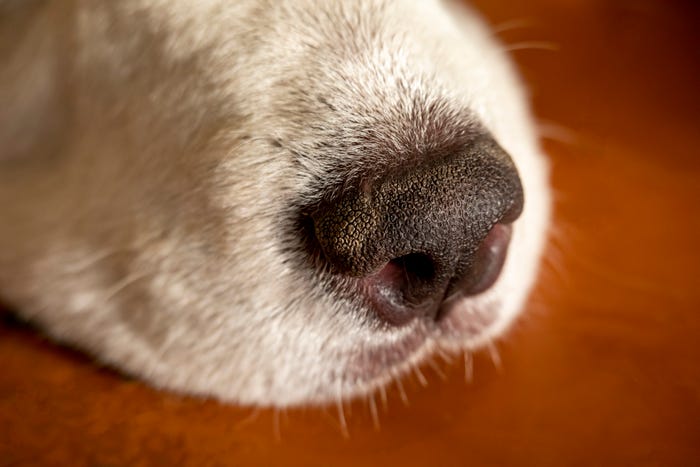A dry nose in dogs may indicate dehydration, illness, or environmental factors. It’s important to monitor the dog’s overall behavior and health in addition to the dryness of its nose.
Factors such as sun exposure, room temperature, or breed characteristics can also influence a dog’s nose moisture. If the dryness persists, consulting a veterinarian is recommended to rule out any underlying health issues. Proper hydration, a balanced diet, and regular health check-ups are essential for maintaining a dog’s well-being.
Observing changes in a dog’s nose moisture level alongside other symptoms can provide valuable insights into their health status. Understanding the potential reasons behind a dog’s dry nose can help pet owners provide appropriate care and attention.

Credit: www.akc.org
Causes Of A Dry Dog Nose
A dry dog nose can be concerning for pet owners, but it’s important to understand the various causes that can contribute to this condition. From dehydration to weather conditions and minor irritations, a dry dog nose can have multiple underlying factors. By recognizing these causes, you can better address the issue and ensure your furry friend is in good health.
Dehydration
Dehydration is a common cause of dry dog noses. Just like humans, dogs need to stay hydrated to maintain a moist and healthy nose. When a dog is not drinking enough water or is experiencing excessive fluid loss, such as through vomiting or diarrhea, their nose can become dry. This is why it’s important to always provide your dog with clean and fresh water and monitor their fluid intake.
Weather Conditions
Weather conditions can also contribute to a dry dog nose. Exposure to extreme temperatures, whether it is hot or cold, can cause the nose to lose moisture. In cold weather, the dryness is often exacerbated by dry indoor heating. Additionally, if your dog spends a lot of time outside, factors such as wind and sun exposure can further contribute to a dry nose. Providing appropriate shelter and ensuring your dog’s living environment is comfortable can help prevent dryness caused by weather conditions.
Minor Irritations
In some cases, a dry dog nose can be attributed to minor irritations. This can include allergies, nasal congestion, or contact with irritants such as chemicals or rough surfaces. These irritations can cause the dog’s nose to become dry and may also lead to other symptoms like itching or sneezing. It’s important to identify and address these irritations to alleviate the dryness and provide relief to your dog.
Credit: www.businessinsider.com
Significance Of A Dry Dog Nose
When it comes to understanding the health and well-being of our furry companions, paying attention to their nose can provide valuable insights. So, what does it mean if a dog’s nose is dry?
Potential Health Issues
A dry nose in dogs could be an indication of an underlying health issue. Dehydration is a common cause of dryness. Dogs can become dehydrated due to illness, excessive heat, or lack of sufficient water intake. Additionally, a dry nose can be a symptom of certain medical conditions such as fever, allergies, or autoimmune diseases. If your dog’s nose remains consistently dry, it’s essential to consult a veterinarian for a thorough examination and proper diagnosis.
Behavioral Changes
A dry nose in dogs might also lead to behavioral changes. Dogs may feel discomfort or irritation, causing them to become lethargic or less playful. Some dogs may exhibit increased panting or seek cooler spots to alleviate the discomfort caused by a dry nose. It’s important for pet owners to observe any unusual behaviors and take appropriate action to address their dog’s discomfort.
How To Care For A Dry Dog Nose
A dog’s nose is an important tool that helps them explore the world around them. A dry nose can be a sign of discomfort or potential health issues. As a responsible pet owner, it’s essential to provide the necessary care to keep your dog’s nose healthy and moisturized.
Provide Adequate Hydration
Ensure your dog has access to plenty of clean and fresh water throughout the day. Proper hydration is essential for maintaining a moist and healthy nose. Consider adding moist foods to their diet to aid hydration.
Protect From Extreme Weather
Shield your dog from extreme temperatures. Excessive heat or cold can cause their nose to dry out. Limit their exposure to harsh weather conditions by keeping them indoors during extreme heat or cold.
Use Moisturizing Balms
Choose a fatty acid-rich balm specifically formulated for dog noses. Apply the balm as directed to help restore moisture and prevent dryness. Opt for natural ingredients to minimize potential irritation.
When To Seek Veterinary Assistance
While a dry nose in dogs is often normal and no cause for concern, there are certain circumstances when seeking veterinary assistance is necessary. If you notice persistent dryness that lasts for more than a day or two, it could be an indication of an underlying health issue. Additionally, if the dry nose is accompanied by other symptoms, it’s important to consult with a veterinarian as soon as possible. Below are some situations where seeking professional help is recommended:
Persistent Dryness
If your dog’s nose remains consistently dry over an extended period, it could be an indication that something is amiss. While occasional dryness may be caused by environmental factors or minor dehydration, persistent dryness could signal an underlying health problem. It’s always better to err on the side of caution and have your furry friend examined by a veterinarian to rule out any serious issues.
Accompanied By Other Symptoms
If your dog’s dry nose is accompanied by other concerning symptoms, it’s crucial to seek veterinary assistance promptly. These additional symptoms could include:
- Excessive thirst or urination
- Lethargy or abnormal behavior
- Loss of appetite
- Wounds or sores that are slow to heal
- Difficulty breathing
While these symptoms may or may not be related to the dry nose, they could be indicative of an underlying health issue that requires immediate attention. A veterinarian will be able to accurately diagnose the problem and provide appropriate treatment.
Remember, your dog’s health is of utmost importance, and it’s always better to seek professional veterinary assistance when in doubt. Trust your instincts as a pet owner and consult with a veterinarian for any concerns regarding your furry companion’s well-being.
Preventing Dry Dog Noses
Dryness in a dog’s nose can indicate a range of issues, from dehydration to underlying health problems. By taking preventative measures, you can help keep your furry friend’s nose moist and healthy. In this article, we will explore two key strategies to prevent dry dog noses: regular grooming and maintaining a healthy environment.
Regular Grooming
Grooming plays a crucial role in keeping your dog’s nose moist and preventing dryness. By maintaining a consistent grooming routine, you can promote healthy moisture levels and minimize the risk of dryness. Here are some grooming tips to consider:
- Regularly clean your dog’s nose with a soft, damp cloth to remove any dirt or debris that may contribute to dryness.
- Apply a veterinarian-approved moisturizer or pet-safe nose balm to your dog’s nose to help retain moisture.
- Brush your dog’s fur regularly to prevent loose hairs from irritating their nose and causing dryness.
- Ensure proper hydration by providing fresh water at all times and encouraging your dog to drink regularly.
Maintaining A Healthy Environment
The environment in which your dog lives can directly impact the moisture levels in their nose. By creating a healthy and conducive environment, you can help prevent dryness. Consider the following:
- Avoid exposing your dog to excessively dry or cold air, as it can dehydrate the nose and lead to dryness.
- Use a humidifier in your home, especially during the winter months, to add moisture to the air and prevent dryness.
- Keep your dog’s living area clean and free from dust, allergens, and irritants that may contribute to dryness.
By following these preventive measures, you can make a significant difference in maintaining a moist and healthy nose for your beloved canine companion. Remember, if you notice persistent dryness or any concerning symptoms, it is always best to consult with your veterinarian for further guidance.

Credit: www.akc.org
Frequently Asked Questions On What Does It Mean If A Dogs Nose Is Dry
Why Is My Dog’s Nose Dry?
A dry nose in dogs can be caused by various factors such as environmental conditions, dehydration, and certain medical conditions. It’s important to monitor your dog’s overall health and seek veterinary advice if the dryness persists or is accompanied by other concerning symptoms.
Conclusion
To wrap it up, understanding why a dog’s nose is dry can provide valuable insights into their overall health. While occasional dryness may be normal, persistent dryness could be a sign of dehydration, illness, or environmental factors. It’s important to monitor your furry friend’s nose regularly and consult a veterinarian if you have any concerns.
Remember, a moist and cool nose generally indicates a happy and healthy pup. Keep your furry companion hydrated and well-cared for, and their nose will thank you!



